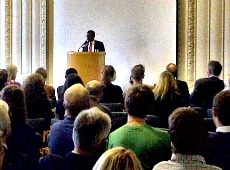A Maldivian NGO has criticised child protection measures currently in place in the country as “inadequate”, while urging government authorities to incorporate several key human rights obligations into domestic law.
Local NGO Advocating the Rights of Children (ARC) told Minivan News today (April 21) that although the Maldives has signed and agreed to be legally bound by the provisions in the Convention on the Rights of the Child (CRC) and its Optional Protocols, the commitments have yet to be adopted into law.
ARC said it therefore “strongly urged” the Maldivian government to ratify the CRC Optional Protocol on a Communications Procedure as soon as possible to “enhance child protection measures in the country and to uphold its international legal obligations and responsibilities under the convention.”
ARC today claimed that provisions outlined in the CRC had not been fully adopted by the state into domestic legislation, thereby limiting the promotion and protection of child rights.
“Even though there is work being done to protect children, it is not enough,” the organisation said.
“The CRC’s optional [communications] protocol allows individuals, a group of individuals or their representatives to submit complaints to the UN Committee on the Rights of the Child claiming to be victims of a violation by the state, of any rights enshrined in the convention or any of its optional protocols which the Maldives is a party to.
“What is very important is that children themselves or their parents can submit complaints if domestic [legal measures] have been exhausted,” ARC added.
ARC cited the recent example of the 15-year-old rape victim from the island of Feydhoo in Shaviyani Atoll who was convicted of premarital sex at the Juvenile Court in February and sentenced to 100 lashes and eight months of house arrest.
“The recent case of a 15-year old girl, whose rights were violated and abused by her step-father is a clear example of how domestic judicial and legal mechanisms failed to address and rectify the violation over a substantial period of time, at different levels,” ARC said.
“This is a situation where an individual complaint to the UN Committee could hold the government accountable even if the ‘domestic remedial system’, including judicial and legal mechanisms, fail to address the issue of abuse.
“Ratifying this optional protocol will help protect the rights of children as it could help reduce the number of cases in the Maldives where a lack of legislation, clarity and commitment to international human rights law allow serious injustices to proliferate,” ARC added.
Council heads and senior civil society figures have previously slammed the judiciary, state authorities and welfare groups over their systemic failure to protect the 15 year-old girl, despite her history of alleged sexual abuse dating back to 2009.
The 15-year-old’s case has brought international attention to the Maldives’ legal system, including the launch of an online Avaaz.org petition signed by over 2 million people that has threatened to boycott Maldivian tourism. The sentencing of the minor has also come under high-profile public criticism from British multi-billionaire Sir Richard Branson, founder of the Virgin group of companies.
Former Attorney General Azima Shukoor has already appealed the court’s sentencing decision against the minor.
ARC said it hope ratifying the treaty in the Maldives would instill “a sense of transparency on child rights issues and encourage the government to be more accountable to its obligations.”
“The protocol is specifically designed to allow members of the public to submit complaints to an international body if children’s rights have been violated,” ARC added.
ARC said it had been informed by the Maldivian government that the ratification process had been started and was hoped to be concluded “at the earliest opportunity”.
UNICEF’s view
The UN General Assembly adopted the CRC’s optional communications protocol (treaty) in December 2011. Tt was first opened for signature in February 2012. Currently only four countries have ratified the treaty, agreeing to be legally bound by its terms.
UNICEF Representative Zeba Tanvir Bukhari explained to Minivan News that the CRC’s optional communications protocol would require a minimum of 10 ratifications before the treaty enters into force.
“Signatures usually happen faster than ratification, however what is signed should be ratified to help enable implementation,” said Bukhari.
She added that achieving societal change in attitudes to child rights was difficult, but there were “many ways of managing” it in the Maldives. Bukhari pointed to maintaining civil society pressure and media attention on the Maldivian government to ratify the CRC optional protocol, as two notable examples on how to secure such changes.
UNICEF previousy backed a study published by the Human Rights Commission of the Maldives (HRCM) in January of this year highlighting numerous policy deficiencies in children’s participation and protection. These deficiencies were highlighted in the report as potentially putting Maldivian children at serious risk of harm.
Ultimately the report recommended that government and civil society organisations “push for a radical change in the traditional thinking which dominates Maldivian perceptions of children: children should be seen and not heard.”
The Maldives has ratified the Convention on the Rights of the Child (February 1991), the Optional Protocol on the Sale of Children, Child Prostitution and Child Pornography (May 2002), and the Optional Protocol on the involvement of children in armed conflict (December 2004).
Legal obligations
A senior legal expert with experience of working under both the present and former governments spoke with Minivan News earlier this year about how minors were identified and viewed in the eyes of Maldivian law.
with Minivan News earlier this year about how minors were identified and viewed in the eyes of Maldivian law.
The legal source stated that the culpability of children was identified in a regulation called ‘Kuda kudhin kuraa kushuge masala thah balai, thahugeegu koh, insaafu koh, adhabu dhinumugai amalu kuraane gothuge gavaidu’.
The legal source said that the culpability of minors is specifically dealt with in section five of the regulations.
“According to section five, children above the age of 10 and below the age of 15 are criminally responsible for five offences, which are apostasy, treason, fornication, falsely accusing fornication and consumption of alcohol,” the source said.
“Children above 15 years are criminally responsible for their actions. With children who are below 10, parents are required to make good any damage because of a criminal act. There is no criminal liability for below 10.”
Meanwhile, neglect and abuse of children were reported to have increased to an “alarming level“, compelling the the Maldives’ Ministry of Gender, Family and Human Rights to submit an amendment (April 7) that would transfer parental guardianship of children in cases of negligence.
Earlier this year, ARC called on the Maldivian government to pass legislation concerning the treatment of sexual abuse victims. The NGO also raised concerns over the potential impact on the state’s ability to prevent sexual offences following reductions to the state budget approved by parliament in December 2012.
ARC has identified a lack of specific legislation protecting rights for children and adults – despite the Special Measures Act 2009.
The NGO also previously called for reforms of the juvenile justice system and reform of the current protection mechanisms provided to minors who are kept in state run institutions, such as homes and foster programs.

